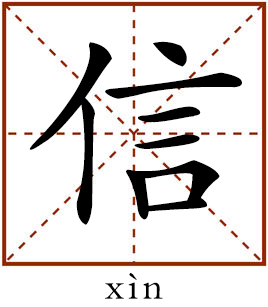Honesty

When used as a noun, this character refers to honesty or integrity. When used as a verb, it means to “trust” or “believe.”
民无信不立
mín wú xìn bú lì
Min refers to people and xin means “trust.” Both wu and bu has a meaning of “not.” Li literally means “stand.”
This term originated from the Confucian classic, The Analects. When Zigong (one of the students of Confucius) asks about government, the Master (Confucius) says, “[A qualified government should equip its country with] Sufficient food, sufficient weapons, and the confidence of the common people.” Zigong said, “Suppose you had no choice but to dispense with one of these three, which would you forgo?” The Master said, “Weapons.” Zigong said, “Suppose you were forced to dispense with one of the two that were left, which would you forgo?” The Master said, “Food. Death has always been the lot of all men; but a people that no longer trusts its rulers is lost indeed.” Honesty has long been valued in Confucianism and other traditional philosophies in China. It is believed that a person or a country without honesty will find it hard to survive.
立木取信
lì mù qǔ xìn
Li means “to set up” and mu refers to wood. Qu means “to obtain” or “to earn” and xin refers to trust.
This term is derived from a story about Shang Yang, a famous statesman whose successful reorganization of the state of Qin paved the way for the eventual unification of the Chinese empire by the Qin Dynasty. According to Records of the Historian, Shang was assigned the task of promulgating the reforms in the Qin kingdom. Fearing that the people would disregard the authorities and the reforms, Shang set up a wooden pillar thirty feet high at the south gate of the market and offered a reward of a few gold pieces to anyone who would move it to the north gate. The people were skeptical and no one dared move it. Then a reward of fifty gold pieces was offered. A man moved the pillar and received the reward, proving that the authorities meant what they said. After that, the new decrees were issued. This story indicates the traditional belief that credibility is crucial to the governance of a country.
edited by REN GUANHONG
